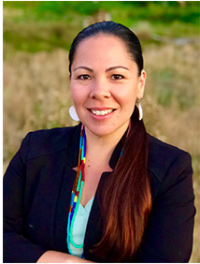In the Latest Edition of River Currents, Columbia Riverkeeper Sat Down for Conversations with Se-ah-dom Edmo, Shoshone-Bannock, Nez Perce, and Yakama.
Riverkeeper: How did you first learn about Riverkeeper and why did you get involved?
Se-ah-dom Edmo: I first connected with Riverkeeper in 2006 as we were beginning to plan the 50th anniversary memorial of the drowning of Celilo Falls. Staff members from Riverkeeper asked if and how they could help. Residents and descendants of Celilo had a gathering over the Thanksgiving weekend where we called back a lot of the community members who were related to or who lived in the village before the flooding. Over 20 volunteers from Riverkeeper cooked for us all weekend so we had the time and space to talk about what we wanted to happen at the 50th

memorial.
It was significant that, when Riverkeeper came to us, they came asking how they could help. That’s why, just after college, when I was invited to apply to be a board member, I said yes, immediately. Riverkeeper was the first nonprofit I volunteered with that not only explicitly included tribes in its mission, vision, and values as an organization, but also in their day-to-day work. I began to understand what it looks like to be an organization that conducts its work in ways that respects and upholds treaty and trust responsibility; it was an experience that has informed the rest of my career.
Riverkeeper: What’s your perspective on how Riverkeeper works in solidarity with tribal nations?
Se-ah-dom Edmo: We have inherited centuries of policies of isolation and assimilation that tell us that tribal nations should not work in coordination with other folks. The mindset: Talk to the U.S. government through government-to-government relationships, only. But if we are going to get serious about undoing the damage that centuries of policies have caused, we must create a better and more integrated system of social, political, and economic power. Before I became more involved with Riverkeeper I didn’t really know what that looked like in practice. How do we do that? Riverkeeper is unique in the river network because tribal nations are in its organizational DNA.
We all know that we don’t lead single-issue lives. If environmental justice is your issue, great. Pick another one. Blend your work, investments, and your activism. Choose from a place that’s meaningful to you.
Riverkeeper: What are you hearing from your grantees about how the pandemic is impacting their work on social and environmental justice?
Se-ah-dom Edmo: The injustices that existed in many people's periphery are now in front of us, laid bare. We are a proud partner of the Oregon Worker Relief Fund, to provide financial relief to Oregonians who, because of their immigration status, cannot access public benefits. We have also established the Since Time Immemorial Fund for tribal communities.
We all know that we don’t lead single-issue lives. If environmental justice is your issue, great. Pick another one. Blend your work, investments, and your activism. Choose from a place that’s meaningful to you.
Riverkeeper: For our members looking to learn more about American Indian identity, can you recommend a book, podcast, or article?
Se-ah-dom Edmo: Subscribe to and support Indian Country Media Today to understand what is going on in Indian Country. If you’re a reader, check out the writings of Philip Deloria. If you’re more of a listener, I recommend the All My Relations podcast. If you just want some beauty in your life, follow Jamie Okuma on social media. She’s also my cousin. The intersectionality chapter of my book is a great introduction to understanding what is happening with all of the different layers of oppression in relation to Indian Identity.
Riverkeeper: Do you have a favorite spot on the Columbia River?
Se-ah-dom Edmo: Celilo. Right now it is just a park. I know where my dad’s house stood; it's under water near the park. I feel like every Native person in the Northwest has a Celilo story about how and when their family went. Even though it's underwater, the power of that place has never gone away.
Get inspired by the last 20 years of impactful work in solidarity with local and regional heroes of our movement.


